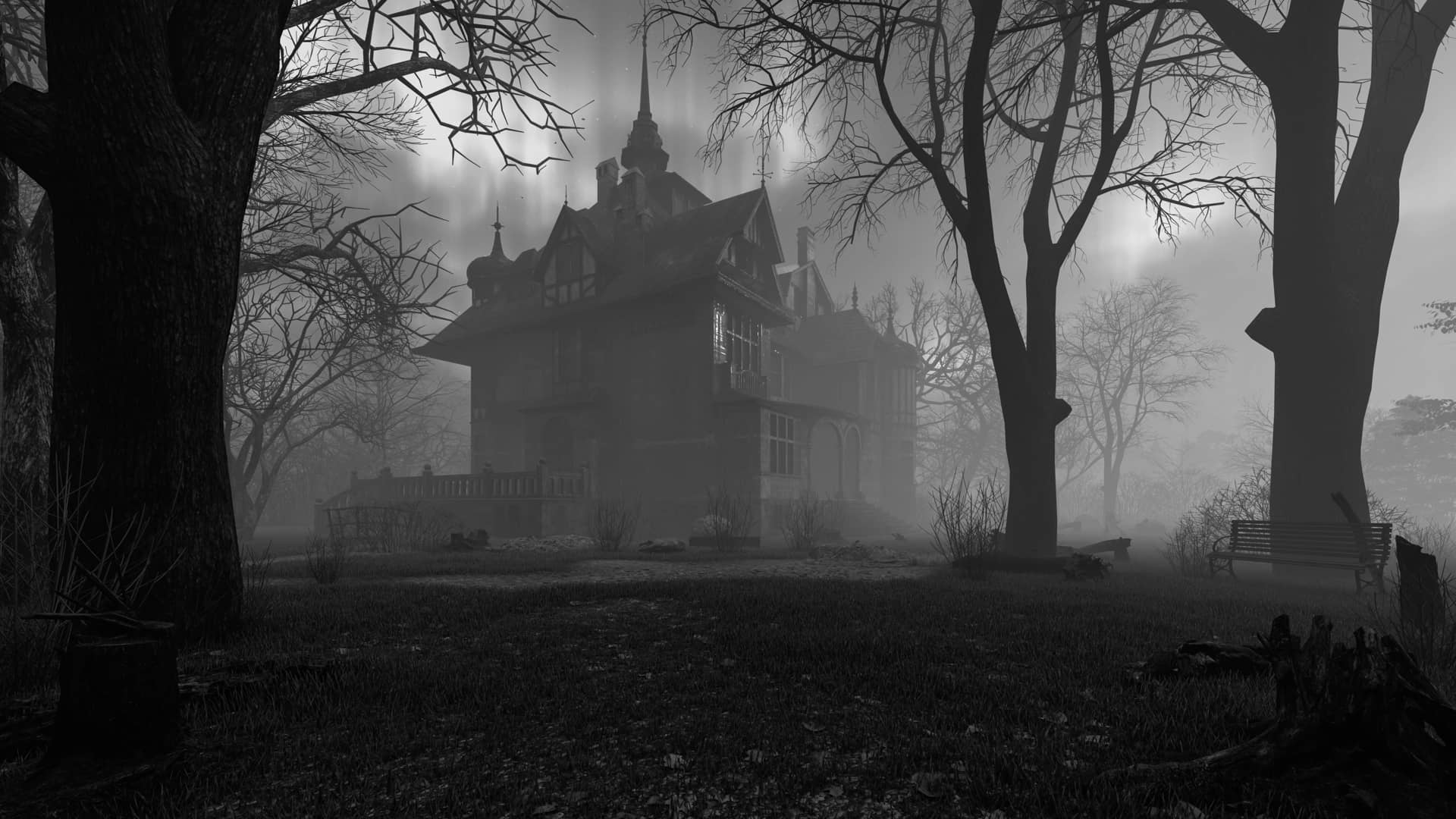When you arrived at the house, the house that was too affordable, the house that had a reputation and that no one wanted to buy, you were prepared. The signs were all there: the overgrown lawn, the family cemetery in the backyard, the dead flies collecting on the windowsills. You walked the perimeter and found small piles of animal bones, a stray tooth near the garden. You placed coffin nails in each corner of the property, sprinkled salt wherever you walked.
You told yourself this was fine, that a few scary stories and a handful of murderers weren’t enough to chase you away, not from the only chance you’d ever have to own a house.
This was your moment.
Before you entered the house, you lined the porch with eggshells and brick dust, drew sigils in white chalk underneath the welcome mat. When you opened the front door, a draft wrapped around your neck. It was hard to breathe, but not impossible. You got used to it. You had no other choice.
The house smelled sour, like rotten catfish, like thick clods of old milk. The drag marks on the wooden floors acted as arrows pointing you toward the kitchen. You rolled your eyes, followed the deep indents of fingernails and begging calling you deeper into the room. A bowl of moldy fruit sat beside the sink, a dead rat near the fridge. You pulled a pack of disposable gloves from the box and got to work.
You separated the chairs stacked on the kitchen table, their limbs reaching toward the ceiling like broken bones, like amputated limbs. You turned on the faucets and let them run bloody, knowing that eventually the house would get bored and give you some digestible water to drink. At night, you lit candles and burned rosemary, boiled a pot of sage and eucalyptus on the stove. When the lights flickered, you set a flashlight next to your laptop, placed a box of matches in your pocket. When they took things to extremes, you considered building a fire.
Over the next few days, you painted the walls red so when they started to bleed, it was hard to tell. Sometimes it clumped in odd patterns, took on a shine in certain light, but most of the time, it just looked like poor craftsmanship rather than a scare tactic.
You removed the doors from the hinges so they couldn’t be slammed. This aggravated the ghosts, especially the little girl with no mouth, because she liked to make an entrance. At times this was frustrating, but with a house full of spirits, there was no such thing as privacy. You adjusted, learned to walk naked through your bedroom, to make coffee in your underwear.
Their moans got loud and long. You’d record them and play them at Halloween for the kids when they stopped for candy. The boys down the street got a kick out of it and mimicked the sounds. Sometimes when you’d brew tea or wash the dishes, you’d randomly scream to show the ghosts what it felt like. They hated this and disappeared through walls or evaporated in frustrated clouds of smoke. Once, they set the curtains on fire, but they were ugly, so you let them burn.
•••
A month went by, then a year.
Some days you’d wake up covered in dirt. You’d take pictures in the attic, sell polaroids to your local newspaper of the decapitated phantom. You’d make thirty dollars, but more graves appeared outside. You’d remove the knives from the kitchen, drive them 10 miles out of state to hide them in a burlap bag beneath an abandoned car. But when you got home the next day, they were all in the kitchen drawer with the jaw of a raccoon placed on top.
You decided to play their games.
At night you’d wear the wedding dress you found in the master closet. It smelled like mothballs and rose cologne. Spiders crawled in and out of the lace sleeves, but you didn’t mind. The old woman in the bathroom screamed for days, her long mouth agape in horror as you used her veil to clean the end table. She slashed at her wrists and pulled out her hair, but the dramatics were pointless. She was already dead. The dress was ruined.
Later that summer, you cleaned out the basement, held a yard sale over the weekend. People arrived and bought rocking chairs and lightly chipped mugs, piles of old vintage clothes. One woman left with the statue of a headless cherub, another with one left shoe. That night, the windows blew out. You laughed and cleaned up the glass, sold the dining room set the next day.
You placed spirit chimes in the garden, planted blue bottle trees near the front porch. When the wind blew, you watched them fill, the wet slap of suction pulling at their thin, spectral bodies. You were a hunter and you left them there for three days, starved them out with claustrophobia and inconvenience.
They mostly left you alone after that.
Every once in a while, though, you’d hear footsteps in the hallways, catch a gust of cold air when sitting outside, but the armless boy with the baby face didn’t try to trip you anymore, and the teenage burn victim stopped setting fire to all your mail. You learned to coexist beneath the crumbling ceiling and the stairs with broken steps, to cook the foods they liked to smell. They accepted their lack of freedom, resigned to possessing the neighbors instead of your dog. Some days, you’d watch them laugh at the TV. Other days, you’d invite the priest over to bless the house. Either way, you still let the squirrels taste your food first, judged their moods, as the number of corpses collected in the driveway.
•••
Three years later, you died in the house.
You were confused. The ghosts were not welcoming or sympathetic, but they did give you space to process the definitive lack now attached to your world. You struggled to maintain your dignity and accidentally broke vases and mirrors when you got mad. One time, you tried to walk through a wall and got stuck for six days. Another time you attempted to talk, and bells rang out instead.
Time lost all meaning. You forgot what thirst was, what pleasure felt like. You didn’t need to eat or sleep but still liked to close your eyes and remember the idea of rest. You were unable to cross over, to find peace, so you wandered through the house, across the property, beneath the soil. You found suicide notes stuffed in the rafters, a pocket watch at the bottom of the well. When the hour slipped into darkness, you liked to crawl into the coldness of trees. When it rained, you pretended to drown in the tub.
It took the living two weeks to find your body. You worked from home, didn’t have close family. By the time they found you, you were bloated, leaking. Flies sat on your eyes. Your mouth hung open, desperate but unheard. When the medics touched you, you shook the shutters, threw shingles off the roof. They slid you into a black bag and you watched as they covered your face. They left without saying goodbye. You whispered curses under your breath, killed the birds nesting in the chimney.
The other ghosts watched silently as you raged. You uprooted the fence, littered dead opossums on the front lawn. One time you carved crosses in all the trees, hung fishing hooks on the porch railings. The house’s reputation spread as something vile, something evil. Grandmothers blessed themselves when they drove by. Teenagers threw burning pumpkins onto the property on Devil’s Night. Even the paranormal teams wouldn’t set foot on the property, and without life to feed on, the house turned to the ghosts, to you.
It ate you slowly, first taking your drive, then your will to exist. It fed on memories, used you as a conduit to attack people you used to love. You noticed yourself fading, steadily being erased. Your eyes lost color, your fingerprints disappeared. At some point, you stopped fighting, stopped caring. Afterall, this was the place you’d hope to die in, the house you fought so hard to make a home. As limbs turned to whisps and presences in the hall dwindled, you thought about death. The kind that waited for you on the other side of digestion. You wondered if the house would starve after you were gone, if maybe, it would start to devour itself.
You smiled at that, found solace in the possibility of the house being in pain. It deserved that in the end, payment for all the damage it caused, and as you blinked in and out, a figment, a reversed séance, you hoped you’d leave a bad taste in its mouth, that your death would haunt it the way it tried (and failed) to haunt you.

